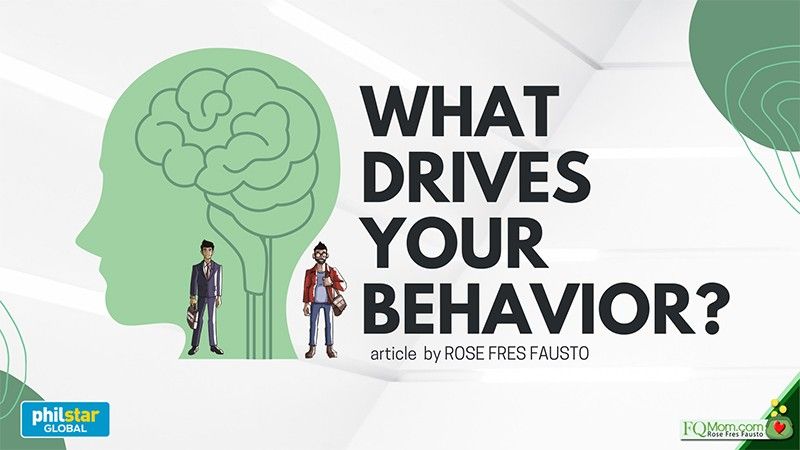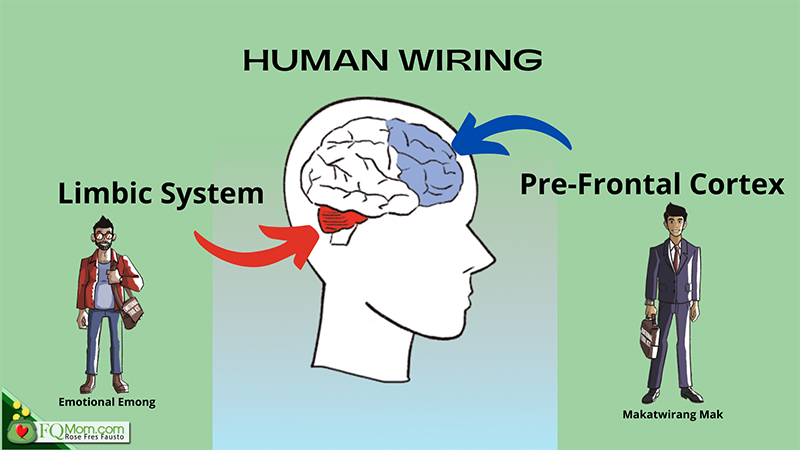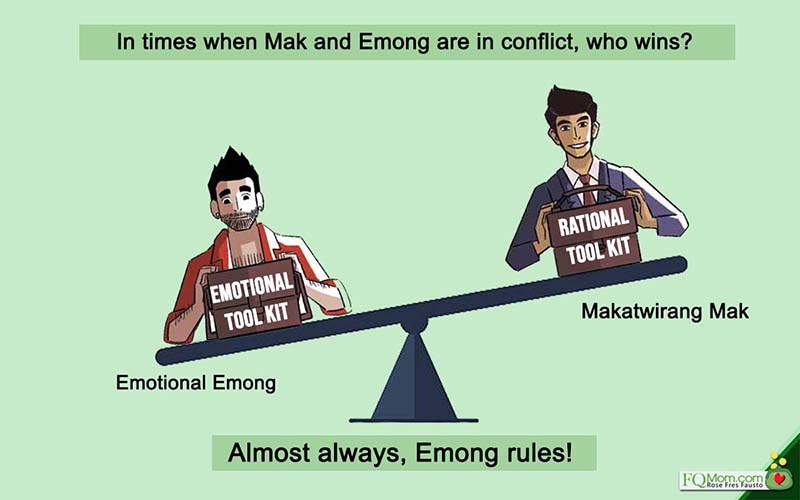What drives your behavior?


When asked this question, what is your answer?
Chances are you will give profound answers such as my goals and dreams in life. This could range from becoming the best in your field, giving a good life to your family, being financially independent, etc.
But if we examine more closely, there are so many things in between your well-thought-out answers and your actual behavior.
We can fully understand this by studying the human wiring. Our brain has two distinct but integrated systems: the prefrontal cortex and the limbic system. To make it easier to understand, let’s personify these two integrated sides.

Prefrontal cortex (our Makatwirang Mak)
The prefrontal cortex is the part of our brain that is responsible for the executive or analytical functions:
It relates to our abilities to:
- Differentiate among conflicting thoughts
- Determine good and bad, better and best, same and different
- Predict future consequences of current actions
- Work towards defined goals
- Act in accordance with social norms
- Inhibit action not considered positive
- Delay gratification
- Perform other complex cognitive functions
Our prefrontal cortex is also known as the cold analytical brain or rational brain. It is our Makatwirang Mak side. When I give you a Math problem, you use your Makatwirang Mak to solve it.
This part of our brain evolved much later compared to the next one we will discuss.
Limbic system (our Emotional Emong)
The limbic system is the part of our brain that is responsible for the emotional functions.
It relates to our:
- Feelings
- Motivation
- Long-term memory
- Olfaction (sense of smell)
- Impulses
- Moods
- Addiction
- Behavior
Do you remember that movie “In and Out”? It personifies five emotions – joy, sadness, fear, anger and disgust. Let’s add the two other basic emotions – surprise and contempt. So, all these seven emotions are processed in our limbic system.

Our limbic system is responsible for switching on our sense of “doom and gloom” and causes us the “fight or flight” reaction. It is called our hot emotional brain because it can make us impulsive and cause us to do unplanned actions. It has a great deal to do with the formation of our memories. This is the basis for what Maya Angelou (writer, activist, and mentor of Oprah Winfrey) said, “People will forget what you said, people will forget what you did, but people will never forget how you made them feel.”
While our limbic system is what we largely use from the time we are born, most neurologists agree that our prefrontal cortex is not fully developed until we reach the age of 25. This could also be the basis why individuals below 25 years old are required to submit a notarized parental consent before they can be issued a marriage license. I know this, I got married a month before my 25th.
To the parents out there who are still blaming themselves each time an adult child fouls up, remember, once they turn 25, the “childhood card” can no longer be used as an excuse. Their prefrontal cortex is already formed. Hmmm… our youngest is turning 25 next week. This gives my husband and me something to celebrate, we’re off the hook!”
In times of conflict
Kidding aside, we should know the dynamics of our Mak and Emong sides. It’s not as if when we reach the age of 25, we will always make the right decisions and do the right things. Why? Because even at age 25, 35, 45…85, or whatever age, our prefrontal cortex still has its limitations. In times when our Makatwirang Mak and Emotional Emong are at opposing sides, guess which one almost always wins?

Sad to say, most of the time, Emong rules! This is the reason why many adults, some holding very important positions, still find it hard to be socially graceful and conform to civil order, especially if they are on top of the totem pole and no one dares to point things out to them.
What do we do?
Given the above, are we all doomed to allow Emotional Emong to be the boss all the time – when it comes to our finances, love life, health, career, relationships, even elections?
Nope, we should remember, that we can still make our Makatwirang Mak prevail over our actions. It is important that we examine ourselves so we know where we are weak at. What are our behavioral biases? In FQ Book 2 Why Financial Education Alone Does Not Work, you will be able to assess how Mak and how Emong you are in the 16 biases that affect your behavior towards money and the other important aspects of your life.
After which, you can summon your Makatwirang Mak to plan, design, and operationalize something rational, ahead of the emotions that Emotional Emong will surely succumb to when faced with a hot situation.
My favorite example when it comes to handling your money is to use default bias to work in your favor. Way before payday, preferably, once you start employment, summon your Mak to operationalize and automate your saving and investing with the use of your payroll bank’s facilities. When sueldo comes, a designated amount automatically goes to your saving/investment account, no need to do anything each payday. Come payday when there is a big sale, even if your Emong side has the capacity to stop the automated saving and investing, it will be effortful to do so. Chances are your Mak’s move to set your payroll account automatic will prevail! That’s how we make our Mak’s rational decisions rule, we should design and operationalize something before we even get to the hot emotional state.
Maybe by now you’re thinking of ways how you can make your Mak rule your behavior when it comes to your health, relationships, career and elections. I’d love to hear your thoughts.
Cheers to embracing both our Mak and Emong sides in order to have a high FQ and a great life!
ANNOUNCEMENTS
1. If you want to know how Mak and Emong you are in all the 16 behavioral biases that affect not just our behavior towards money, but also the other important aspects of life, grab your copy of “FQ Book 2” – https://fqmom.com/bookstore/
To know more about “FQ Book 2”, watch this short video.
2. Thinking of what Christmas gifts to give? Maybe something that will improve their financial life will be a great gift. Avail of our ongoing Christmas promo.

3. Join us on Kumu Money Lessons with FQ Mom and Sons on Thursday at 11 a.m.

This article is also published in FQMom.com.



















